
-
 K-pop band NewJeans leaves label over 'mistreatment'
K-pop band NewJeans leaves label over 'mistreatment'
-
Sri Lanka crash to record low Test total of 42 in South Africa

-
 Putin says barrage 'response' to West-supplied missiles
Putin says barrage 'response' to West-supplied missiles
-
Lebanon MPs seek end to leadership vacuum with January presidency vote

-
 Eurozone stocks lift as French political stand-off eases
Eurozone stocks lift as French political stand-off eases
-
French farmers wall off public buildings in protest over regulations

-
 France says ready for budget concessions to avert 'storm'
France says ready for budget concessions to avert 'storm'
-
Lampard appointed Coventry manager

-
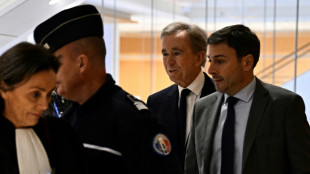 French luxury mogul Arnault defiant at ex-spy chief trial
French luxury mogul Arnault defiant at ex-spy chief trial
-
South Africa bowled out for 191 against Sri Lanka

-
 'Europe's best' Liverpool aim to pile pain on Man City
'Europe's best' Liverpool aim to pile pain on Man City
-
Hezbollah under pressure after war with Israel

-
 OPEC+ postpones meeting on oil output to December 5
OPEC+ postpones meeting on oil output to December 5
-
Zelensky slams Russia's 'despicable' use of cluster munitions in energy strikes

-
 One dead, thousands displaced as floods hit southern Thailand
One dead, thousands displaced as floods hit southern Thailand
-
Lebanon army deploys under Israel-Hezbollah ceasefire

-
 Imran Khan's wife Bushra Bibi emerges as Pakistan protest figure
Imran Khan's wife Bushra Bibi emerges as Pakistan protest figure
-
COP16 biodiversity talks to restart in February: UN
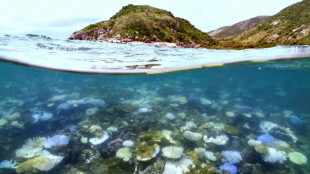
-
 Iran to hold nuclear talks with three European powers
Iran to hold nuclear talks with three European powers
-
French govt ready for budget concessions to avoid financial 'storm'

-
 Hong Kong airport third runway takes off
Hong Kong airport third runway takes off
-
In Bosnia, the path to renewables runs through its coal mines
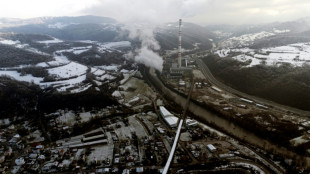
-
 China probes top military official for corruption
China probes top military official for corruption
-
Syria war monitor says more than 130 dead in army-jihadist clashes

-
 China says top military official Miao Hua under investigation
China says top military official Miao Hua under investigation
-
Taiwan president's plan to stop over in Hawaii, Guam angers Beijing

-
 Russian attacks leave one million Ukrainians without power
Russian attacks leave one million Ukrainians without power
-
Markets mixed after subdued pre-holiday shift on Wall St

-
 What would an ICC arrest warrant for Myanmar's junta chief mean?
What would an ICC arrest warrant for Myanmar's junta chief mean?
-
China says top military official Miao Hua suspended, under investigation

-
 Taiwan's Lai to stop over in Hawaii, Guam during Pacific trip
Taiwan's Lai to stop over in Hawaii, Guam during Pacific trip
-
Namibia extends voting after logistical issues

-
 LIV Golf's Herbert in charge at Australian Open, Smith two back
LIV Golf's Herbert in charge at Australian Open, Smith two back
-
Despair in Sweden as gangs recruit kids as contract killers

-
 Russia launches massive aerial attack on Ukraine's energy sector
Russia launches massive aerial attack on Ukraine's energy sector
-
Peru scientists unveil crocodile fossil up to 12 million years old
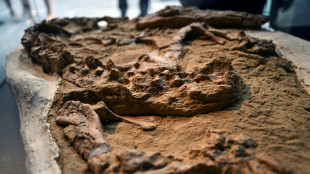
-
 At plastic treaty talks, no united front for industry
At plastic treaty talks, no united front for industry
-
Williamson falls for 93 as England fight back in first Test

-
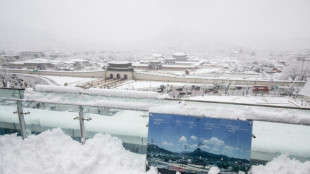 South Korea officials say three dead in heavy snowfall
South Korea officials say three dead in heavy snowfall
-
High-flying Fiorentina face test of Scudetto credentials with Inter visit

-
 Verstappen switches focus to re-boot defence of F1 teams' title
Verstappen switches focus to re-boot defence of F1 teams' title
-
UK filmmaker Richard Curtis makes first foray into animation

-
 Countrywide air alert in Ukraine due to missile threat
Countrywide air alert in Ukraine due to missile threat
-
China's military corruption crackdown explained

-
 Primark boss defends practices as budget fashion brand eyes expansion
Primark boss defends practices as budget fashion brand eyes expansion
-
Williamson eyes ton as New Zealand take control against England

-
 Norway faces WWF in court over deep sea mining
Norway faces WWF in court over deep sea mining
-
Trump, Sheinbaum discuss migration in Mexico amid tariff threat

-
 Asian markets mixed after subdued pre-holiday shift on Wall St
Asian markets mixed after subdued pre-holiday shift on Wall St
-
Orban's soft power shines as Hungary hosts Israeli match


Mountain melt shutters classic Alpine routes
Little snow cover and glaciers melting at an alarming rate amid Europe's sweltering heatwaves have put some of the most classic Alpine hiking routes off-limits.
Usually at the height of summer, tourists flock to the Alps and seek out well-trodden paths up to some of Europe's most iconic peaks.
But with warmer temperatures speeding up glacier melt and thawing permafrost -- which scientists say are driven by climate change -- routes that are usually safe this time of year now face hazards like falling rocks released from the ice.
"Currently in the Alps, there are warnings for around a dozen peaks, including emblematic ones like Matterhorn and Mount Blanc," Pierre Mathey, head of the Swiss mountain guide association, told AFP.
This is happening far earlier in the season than normal, he said.
"Usually we see such closures in August, but now they have started at the end of June and are continuing in July."
- 'Postpone' -
Alpine guides who usually lead thousands of hikers up towards Europe's highest peak announced earlier this week that they would suspend ascents on the most classic routes up Mont Blanc, which straddles France, Italy and Switzerland.
The Guide Alpine Italiane said on its Facebook page that the "particularly delicate conditions" caused by the temperature spike made it necessary to "postpone the climbs".
Mountain guides have also refrained -- reportedly for the first time in a century -- from offering tours up the classic route to the Jungfrau peak in Switzerland.
And they have advised against tours along routes on both the Italian and Swiss sides of the towering pyramid-shaped Matterhorn peak.
Ezio Marlier, president of the Valle D'Aosta guides association, said having to steer clear of routes most coveted by tourists was a blow after the Covid slowdowns.
"It is not easy... after two almost empty seasons to decide to halt work," he told AFP.
He stressed that the Italian Alpine region had shut only two and that there were many other breathtaking and safe routes to take.
But he lamented that many people simply cancelled their trip when they heard their preferred route was off-limits.
"There are plenty of other things to do, but usually when people want Mont Blanc, they want Mont Blanc."
- Dangerous glaciers -
Climbing on some of the thousands of glaciers dotting Europe's largest mountain range is also proving trickier.
"The glaciers are in a state that they are usually in at the end of the summer or even later," said Andreas Linsbauer, a glaciologist at Zurich University.
"It is sure that we will break the record for negative melts," he told AFP.
He said a combination of factors were contributing to a "really extreme" summer, starting with exceptionally little snowfall last winter, meaning there was less to protect the glaciers.
Sand also blew up from the Sahara early in the year, darkening the snow, which makes it melt faster.
And then the first heatwave hit Europe in May, with subsequent ones following in June and July, pushing up temperatures even at high altitudes.
The rapid melting can make glaciers more dangerous, as seen with the sudden collapse of Italy's until then seemingly harmless Marmolada glacier earlier this month, which saw 11 people killed as ice and rock hurtled down the mountain.
While scientists have yet to draw clear conclusions on what caused the disaster, one theory is that meltwater may have reached the point where the glacier was frozen to the rock, loosening its grip.
- 'Invisible threat' -
Mylene Jacquemart, a glacier and mountain hazard researcher at Zurich's ETH university, told AFP there were many unknowns about the catastrophe.
"But the general theme is definitely that more meltwater... makes things complicated and potentially more dangerous."
Mathey, who said warmer temperatures had put mountain guides on high alert, also voiced concern that meltwater filtering under a glacier posed an "additional and invisible threat".
But despite the challenges, he voiced confidence that guides would find solutions, seeking out alternative routes to keep showing off Alpine splendours.
"Resilience is really in the mountain guides' DNA," as is adaptability, he said.
"Humans have to adapt to nature and to the mountains, not the other way around."
F.Müller--BTB

